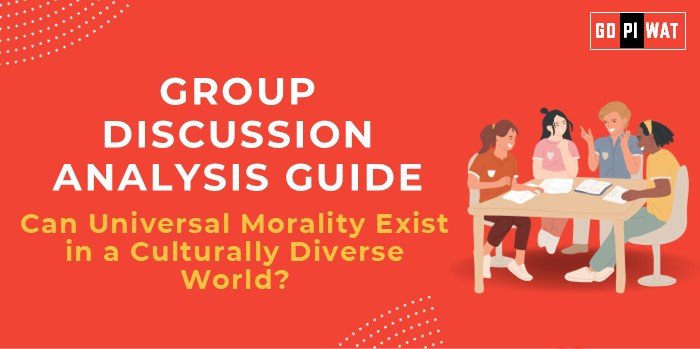📋 Group Discussion (GD) Analysis Guide: Can Universal Morality Exist in a Culturally Diverse World?
🌐 Introduction to Universal Morality
Opening Context: In a world interconnected by globalization yet divided by diverse cultural identities, the question of whether a universal moral framework is possible becomes increasingly critical. For business leaders and policymakers, navigating these differences is key to global collaboration.
Topic Background: The debate on universal morality dates back to philosophical discussions by Immanuel Kant, who posited the existence of universal moral laws, contrasting with cultural relativists who argue morality is culture-specific. The modern context includes globalization, international law, and human rights frameworks as potential universal standards.
📊 Quick Facts and Key Statistics
- 🌍 United Nations Membership: 193 countries adhere to the Universal Declaration of Human Rights (UDHR), adopted in 1948.
- 🌎 Cultural Diversity: Over 7,000 languages spoken worldwide reflect deep cultural differences in moral values.
- 📈 Global Human Rights Index: Reveals gaps in adherence to universal principles, highlighting cultural and political barriers.
- 🙏 Religious Influence: 84% of the global population follows a religion, many with distinct moral doctrines.
👥 Stakeholders and Their Roles
- 🏛️ Governments: Create laws aligned with cultural and universal values.
- 🌍 International Organizations: Promote global standards, e.g., the UN and WHO.
- ⛪ Religious Institutions: Advocate for moral teachings but may conflict with universal norms.
- 🧑🤝🧑 Global Citizens: Navigate personal beliefs within a broader moral framework.
🏆 Achievements and Challenges
- ✨ Achievements:
- Adoption of global treaties like the UDHR.
- Increased global cooperation in addressing issues like climate change and human trafficking.
- Cross-cultural dialogue platforms (e.g., UNESCO).
- ⚠️ Challenges:
- Cultural Relativism: Disagreement on universal norms, e.g., LGBTQ+ rights.
- Global Inequities: Moral frameworks influenced by power imbalances.
- Conflicting Religious Doctrines: Divergent stances on issues like women’s rights.
🌍 Global Comparisons
- 🇸🇪 Universal Success: Scandinavian countries often align their policies with universal human rights norms.
- 🇸🇦 Cultural Divergence: Middle Eastern countries prioritize Sharia law, sometimes conflicting with universal standards.
📂 Structured Arguments for Discussion
- 💡 Supporting Stance: “Universal morality ensures justice and equality across diverse societies.”
- ⚖️ Opposing Stance: “Moral frameworks must be rooted in cultural contexts to remain relevant and effective.”
- 🔄 Balanced Perspective: “A hybrid model recognizing universal principles but adaptable to cultural contexts is ideal.”
🛠️ Effective Discussion Approaches
- 📊 Opening Approaches:
- “Over 190 nations agreed on the UDHR, but disparities in implementation highlight cultural challenges.”
- “Religious teachings often oppose universal moral claims, revealing a deep philosophical divide.”
- 🔄 Counter-Argument Handling:
- Example: “While cultural contexts are critical, universal norms like basic human rights provide foundational justice.”
🔍 Strategic Analysis of Strengths and Weaknesses
- 💪 Strengths: Promotes global justice, aligns with international laws.
- ⚠️ Weaknesses: Risks cultural erasure, lacks enforceability.
- 🚀 Opportunities: Encourages global collaboration and peace.
- ⚡ Threats: May lead to cultural pushback and geopolitical tensions.
🏫 Connecting with B-School Applications
- 📌 Real-World Applications: Topics for cross-cultural leadership, global CSR, and ethical policymaking.
- ❓ Sample Interview Questions:
- “How would you navigate a moral conflict in a culturally diverse team?”
- “Can a global business strategy be ethical without respecting cultural differences?”
- 💡 Insights for B-School Students:
- Understanding universal vs. local ethics can aid in handling multinational projects and conflicts.


